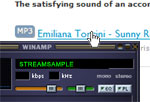Interstellar
Wednesday, April 20th, 2005 by Andrew Laddacoustic guitar // tranquil indie rock
 Interstellar are a Toronto duo, much like the classic team of The Skydome and The CN Tower (only less architectural). Their music is an odd blend of synths, vaguely manipulated vocals, and a soft, acoustic sensibility―guitars, crickety cymbals, and well-rounded chords. I got hold of a promo of theirs about a year ago when their last album was released, because Sean from Said the Gramophone was getting ready to move to another country and was trying to jettison the heaps of CDs he had lying around. I picked it, admittedly, because it came on a cool-looking mini CD, but its quiet charm turned out to be utterly captivating, so there you go: you can judge a CD by its cover. Comparison-wise, think Blue States, Bedspace, and maybe Departure Lounge.
Interstellar are a Toronto duo, much like the classic team of The Skydome and The CN Tower (only less architectural). Their music is an odd blend of synths, vaguely manipulated vocals, and a soft, acoustic sensibility―guitars, crickety cymbals, and well-rounded chords. I got hold of a promo of theirs about a year ago when their last album was released, because Sean from Said the Gramophone was getting ready to move to another country and was trying to jettison the heaps of CDs he had lying around. I picked it, admittedly, because it came on a cool-looking mini CD, but its quiet charm turned out to be utterly captivating, so there you go: you can judge a CD by its cover. Comparison-wise, think Blue States, Bedspace, and maybe Departure Lounge.Dreary and calm, like a cup of tea on a rainy day.
 In ’98, I spent the summer on a ladder scraping dry blue paint off an ugly house. Albeit a shitty job, I had a 2X CD-R drive at home that birthed a hiphop mix including The Herbaliser’s “The Blend” featuring vocalist What What. One of my co-scrapers (from ghetto Hartford) dug the track so much that he replaced his prized Nas CD with the Herbaliser. I never saw that CD again. Now, the hip-hop powerduo is releasing their latest album, Take London, on the premire British beats label
In ’98, I spent the summer on a ladder scraping dry blue paint off an ugly house. Albeit a shitty job, I had a 2X CD-R drive at home that birthed a hiphop mix including The Herbaliser’s “The Blend” featuring vocalist What What. One of my co-scrapers (from ghetto Hartford) dug the track so much that he replaced his prized Nas CD with the Herbaliser. I never saw that CD again. Now, the hip-hop powerduo is releasing their latest album, Take London, on the premire British beats label  Little can put your mind at ease the way that some quiet bossa nova can. Fonseca, a producer and instrumentalist who has collaborated with
Little can put your mind at ease the way that some quiet bossa nova can. Fonseca, a producer and instrumentalist who has collaborated with  Labeling this track “underground hiphop” or “real hiphop”, although completely appropriate, would be misrepresentative in this case. “Count Your Blesings” is radio-friendly. It’s production’s polished. Its sound’s got bounce. And it doesn’t feel like most other on/under the radar hiphop because.. well, it’s pop hiphop. Just a warning though, Emanon is a duo: MC
Labeling this track “underground hiphop” or “real hiphop”, although completely appropriate, would be misrepresentative in this case. “Count Your Blesings” is radio-friendly. It’s production’s polished. Its sound’s got bounce. And it doesn’t feel like most other on/under the radar hiphop because.. well, it’s pop hiphop. Just a warning though, Emanon is a duo: MC  The ‘folktronica’ name has been getting a lot of flack lately, though it may be well deserved. It’s a cheap cliché descriptor for music contructed with the aid of a computer. Yet this doesn’t differentiate from any other genre; we might as well call them hiphoptronica and indierocktronica. Synthesized sounds have a significant influence on nearly all modern music. Folktronica is just a naturalistic (and somewhat minimalistic) approach to songwriting that often uses samples such that you can hear they’re samples and develops a warm atmosphere of sound out of seemingly chilly sounds. Here,
The ‘folktronica’ name has been getting a lot of flack lately, though it may be well deserved. It’s a cheap cliché descriptor for music contructed with the aid of a computer. Yet this doesn’t differentiate from any other genre; we might as well call them hiphoptronica and indierocktronica. Synthesized sounds have a significant influence on nearly all modern music. Folktronica is just a naturalistic (and somewhat minimalistic) approach to songwriting that often uses samples such that you can hear they’re samples and develops a warm atmosphere of sound out of seemingly chilly sounds. Here,  This isn’t what I wanted to post. I really wanted to give you the original song straight up. Alas, remixes are a dirty scene; and I can only provide you with an mp3 with transitions on either end. As far as I can tell, no single standalone exists. This is alright with me, this song deserves to have subservient songs on either end. A wide, fat slam-ass steamroller bassline flattens out the foundation of this song, while some hop-skip house action on top rounds out the funky-ass groove. This is straight off of a complilation put together by Les Rhythmes Digitales’s Jacques Lu Cont.
This isn’t what I wanted to post. I really wanted to give you the original song straight up. Alas, remixes are a dirty scene; and I can only provide you with an mp3 with transitions on either end. As far as I can tell, no single standalone exists. This is alright with me, this song deserves to have subservient songs on either end. A wide, fat slam-ass steamroller bassline flattens out the foundation of this song, while some hop-skip house action on top rounds out the funky-ass groove. This is straight off of a complilation put together by Les Rhythmes Digitales’s Jacques Lu Cont. I’ll make the easy assumption and say you deal with a good number of mp3 blogs on a regular basis. I’ve got a method of sampling the music on them that’s quick and easy. You can skip right to the music to see if you like it. The technique is essentially streaming the file to your audio player, instead of downloading the entire file first. This saves you time, energy, and lets you listen to much more music in less time. Check out the screencast below to get the skinny on it.
I’ll make the easy assumption and say you deal with a good number of mp3 blogs on a regular basis. I’ve got a method of sampling the music on them that’s quick and easy. You can skip right to the music to see if you like it. The technique is essentially streaming the file to your audio player, instead of downloading the entire file first. This saves you time, energy, and lets you listen to much more music in less time. Check out the screencast below to get the skinny on it.
 No, not another money-spinner for Apple Computers; i:cube is actually a French electronica producer who pops off misty, wondrous chillout without succumbing to the sort of washed out electronic noise that one so often finds on chillout albums. I discovered this album in Boston, of all places, back when the Virgin Megastore on Newbury was still a Tower Records (how’s that for old-school?); my friend Susan and I bought a copy each, seduced by our listening-post experiences of ‘Adore’, the title track. It’s got gently popping bubbles in the bass, and wide shimmers of strings and keys over the top. ‘Tropiq’ is darker, grimier; but I love that salt-shaker beat.
No, not another money-spinner for Apple Computers; i:cube is actually a French electronica producer who pops off misty, wondrous chillout without succumbing to the sort of washed out electronic noise that one so often finds on chillout albums. I discovered this album in Boston, of all places, back when the Virgin Megastore on Newbury was still a Tower Records (how’s that for old-school?); my friend Susan and I bought a copy each, seduced by our listening-post experiences of ‘Adore’, the title track. It’s got gently popping bubbles in the bass, and wide shimmers of strings and keys over the top. ‘Tropiq’ is darker, grimier; but I love that salt-shaker beat. When
When